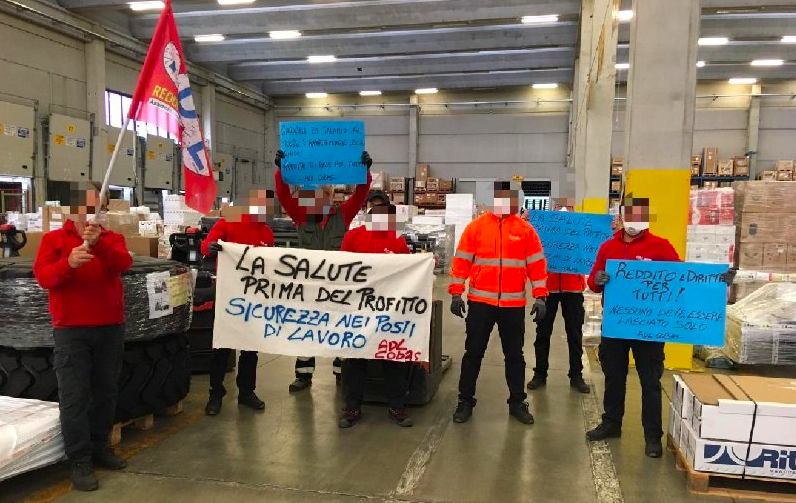After an escalation of measures to contain the spread of the Coronavirus, Italy has been in full lockdown for a week while a campaign for a “quarantine income” has taken off there. As more countries are implementing social distancing measures, we have translated this text by Eleonora Priori, originally published by NERO editions, partly as a way to spread information about what’s happening in Italy but even more because we find some of its insights relevant for the current transnational debate on the social and political implications of the pandemic.
(Image credit: https://www.facebook.com/REDDITODIQUARANTENA/)
After the first days of deafening media sensationalism, and after having (almost) come to terms with the boredom and the unavoidable dwarfing of our daily lives, we are witnessing how the debate on the Coronavirus is focusing on its short- and long-term effects on the economy. The stock markets have registered their worst period since the 2008 crisis and uncertainty about the future is stronger than ever. The economists are divided between those who argue that the current economic and financial slowdown will be followed by a swift recovery and those who think that the recessive effect could be magnified with disastrous consequences. Those who have faith in the resilience of the economy, for example ECB President Christine Lagarde, insist on the idea that it is yet to be determined whether the Coronavirus will cause “a long-lasting shock”. Such positions tend to highlight the role of monetary policy as an instrument to stabilise the financial system, yet they do not seem to take into account that this economic model is less and less sustainable for increasing sections of the population, people whose problems are no doubt more material than hardly comprehensible financial indexes, even if they unwillingly depend on the latter.
Increasingly often, the most worried commentators voice their concerns on the structural limits of a model that is not only inadequate for reacting to “exogenous” shocks (i.e. not due to variables that are internal to the economic system, as the Covid-19 crisis is presented) but that is also intrinsically geared towards increasing inequalities. If, on the one hand, it is possible to imagine the key factors of a potential recovery through a probabilistic calculation on where (and when) it will be profitable to reinvest, on the other hand, the high number and complexity of relevant variables make all prediction attempts shaky. In this context, the elaboration of predictions is risky to say the least, yet the feeling that this economic model is no longer sustainable grows more and more and seems to be bigger than this contingent emergency, which has had rather the role of exploding once again the contradictions of the system.
On a European level, Italy is the epicentre of a crisis that is evidencing the fragilities and the inadequacy of the Eurozone’s economic governance. In this respect, many – including Italy’s PM Giuseppe Conte – are demanding that the European institutions accept flexibility regarding state deficits. Moreover, in a context reminiscent of a financial bubble, it is necessary to keep in mind that, as BCE Vice-President de Guindos declared, the virus can have effects on both demand and supply, an impact on the real economy that in Italy is already manifest in the paralysis of entire sectors and that will predictably engulf more areas of the world in the coming weeks.
These developments invite a reflection on the role of borders in the big globalised machine. Through it, territorially circumscribed epiphenomena amplify their resonance with quickly escalating implications from the local to the global level, both in perceived and real terms. The pandemic thus reaches a world scale. This is an irreversible process determined by the growing speed of circulation of fluxes of people, information and commodities, inherently part of the myth of progress. The hypothesis of a police-centred response, focused on the imperative to strengthen controls and borders, is part of a purely racist and repressive logic and is deeply anachronistic; it would be an old response to a (relatively) new problem. What we need is rather a change in the social and economic paradigm through new instruments, able to face the complexity caused by increased globalisation. It is necessary to weave new webs of social security, which can adequately address people’s needs aspiring to universal coverage. Regarding the viral emergency, for example, it is appropriate to reflect on the necessity for a health care system beyond the national scale and for new forms of economic safety nets – as shown by the campaign for a quarantine income – to face a crisis engendered by the lockdown of productive activities.
Although in this scenario the media crisis plays a more relevant role than the diffusion of the real virus itself, it is useful to remember that the precautionary measures that shut down some productive activities, hitting small and large economic hubs to the point that the whole Italy is now a red zone, will be useful in checking the spread of the virus. The uncontrolled exoduses from the first quarantined cities before the measure was extended to the whole country, the endless queues at supermarkets and the shortages of some products, the semi-deserted cities and the suspicious looks every time somebody coughs in a shop, are the effects of the diffusion of fear, to which media sensationalism contributed. Yet if there is an element of lack of community care in some individual choices, other reactions – even if quite disorderly – are very much comprehensible in such an unprecedented emergency situation.
Specifically, the measures taken by the Italian government are not a consequence of mass hysteria. As stated by several experts, the decision reflects a rational calculation on the capacity of the national health care system, who would not be able to take the hit of a vast spread of the contagion. In fact, if the peak in the number of infected people were sudden rather than diluted over time, the national health care system would not be able to guarantee adequate care for all: we are talking about a population of 350,000 potential infected and just 4,000 available intensive care beds.
This reasoning is thus undoubtedly correct, but it comes after decades of welfare dismantling: it should make us angry about the sorry state of public health care, especially if we consider which social groups are most exposed to the risks of such a model. This problem does not affect Italy alone. For example, the declarations by US vice-president Mike Pence, who triumphally announced the availability of 2,500 test kits for a population of 327 million people, would be laughable if they didn’t demonstrate the total unpreparedness of the US health care system to face this health emergency. In Italy and abroad, we are seeing the results of decades of privatisation policies and the constant underfunding of health care, whose effects in terms of decreased services and research funds have highly uneven impacts on the population. As always, the least protected strata will pay the highest price.
Connecting the state of emergency to a Foucault-like reflection on biopolitics and social control, for example like Agamben did, is in this case basically wrong, because there is no continuity between the traditional repressive rhetoric and the current conjuncture. We will be able to evaluate if there actually was such a political intention only after the fact, when the state of emergency will be over. Doing it now is a mere mystification. Ridiculing people’s fears and precautions, the masks and panic buying, is a lack of acknowledgment of a privilege – or rather a set of privileges – that it would be better to recognise: being in good health, probably not exposed to the worst effects of the virus, having access to care and to a steady income. All factors that allow people to face this period feeling relatively secure.
Rather than displaying arrogant attitudes, it would possibly be more useful to see this situation as an occasion to activate mutualist solidarity networks, like some social movement organisations – but also many ordinary people – are already attempting to do. In many blocks of flats and neighbourhoods, signs offering to do the shopping and other services for those who can’t go out are frequent, and every day there appear small and big proposals for self-organisation to face the coming days of emergency. This solidarity is probably the best antidote against the risks of an actual repressive crackdown.
If we are angry about the downsizing of our personal freedoms or – more prosaically – we get annoyed about having to give up our daily routine, let us keep this rage and channel it towards those who have systematically eroded all forms of welfare in favour of “free market” and unsustainable profits. The same model that, among other things, has normalised the intensive farming industry that generated, for example, the avian flu. The very same model according to which it is unavoidable and right that the prices of sanitisers and medicines skyrocket, faithful to the one and only god of supply and demand.
A certain discourse that reduces the value of life to a statistic, a cost worth taking because those who will die from the Coronavirus will be “only” the weakest (the elderly, the immunocompromised and, as always, the poorest), must be pushed back with a radical proposal for a rethinking of the welfare system, which must place at centre stage public interest and universal social security, both in health and economic terms.
In fact, if the emergency dispositif enacted in Italy during these weeks simply corresponds to an acknowledgement of the total inadequacy of our welfare system for protecting public health, concerns over the economic security of the most precarious subjects have been insufficient. The contradictions of the present conjuncture are now manifest. On the one hand, the suspension of numerous activities and services is putting an enormous number of people in a very hard situation. The emergency has put their economic fragility under attack and it is necessary to put in place as soon as possible some social security measures to guarantee them a dignified quality of life. On the other hand, the widespread adoption of so-called “smart-working” represents a desperate attempt to hide behind the emergency rhetoric an additional flexibilisation of the employment relation, a trend that has long been in existence (think for example about all the freelance and “self-employed” workers). Such practices have come with increased fragmentation and precarisation for thousands of workers, who see the costs that should be born by the employer offloaded onto their shoulders. The further offloading of such costs using the current conjuncture as justification is a politically irresponsible act which worsens people’s working and life conditions. Therefore, it is necessary to put in place at least some corrective measures to make working from home an actual instrument for the safety of the worker rather than yet another tool for increasing exploitation and precarity, especially in times like this.
The current conjuncture, as I have already highlighted, represents an occasion to reflect on the structural limits of the economic and social system we inhabit, but also to think about possible experimentations to overcome it. For example, in Hong Kong, the government approved some sort of fiscal helicopter money measure to address the nosediving of aggregate demand, awarding 10,000 HK dollars (about £1,050) to all citizens over-18. “Desperate times call for decent measures” commented Roberto Ciccareilli in a good article published by il Manifesto, observing how this policy hints at a possible institutionalisation of an universal basic income.
In his book The Great Leveller, Walter Scheidel traces the history of inequality from the Stone Age to today, seeing inequality as the structural cause of violence in human society and identifying – in somewhat apocalyptic tones – four mighty “levelling” forces able to check it: large-scale wars, state breakdowns, revolutions and epidemies. In Futurability, Bifo – citing Mbembe – expresses a similar idea when he speaks of necronomics, identifying violence as a key element in the production process, a specific cycle of capital accumulation. In Scheidel’s to some extent sarcastic account, the death of millions can play a role of social rebalancing, but with manifestly unsustainable costs. Apart from the provocation, the question this text calls forth is whether there are alternative mechanisms to level inequality. Effectively, an instrument like a universal basic income would be a powerful viable measure to avert social breakdown in a situation like the present one.
And there is another highly interesting aspect of today’s situation. To make an excessive claim, we have discovered that the capitalist machine can – at least partially – be stopped, that it is possible to put public health and wellbeing before economic indicators. Even the air we are breathing is evidently cleaner when the works of production are clogged. Without being satisfied with somewhat naïve versions of de-growth – which bring with them other highly complex contradictions – we are now witnessing a preview of what happens when system failure emerges in all its virulence. Let us reflect on the limits and potentialities of an unprecedented situation, on what we want to keep and what to discard. Let us build a consensus around the idea that alternative societal models can and must exist; let us do it now, precisely in this moment when capitalism is, maybe, facing a crisis of consent. Before capitalism learns once again to restructure to keep reproducing itself, let us bring this lesson home: this mode of production can be challenged. Let us remember this when the health emergency is over, in order to imagine new possibilities.





